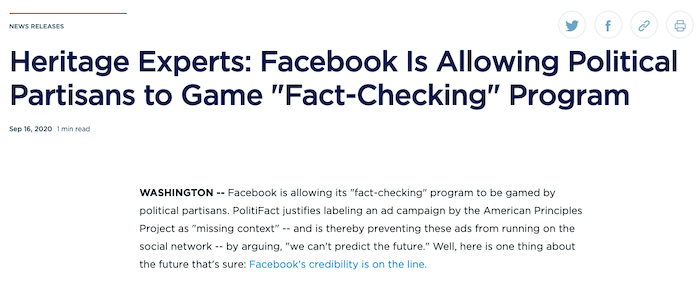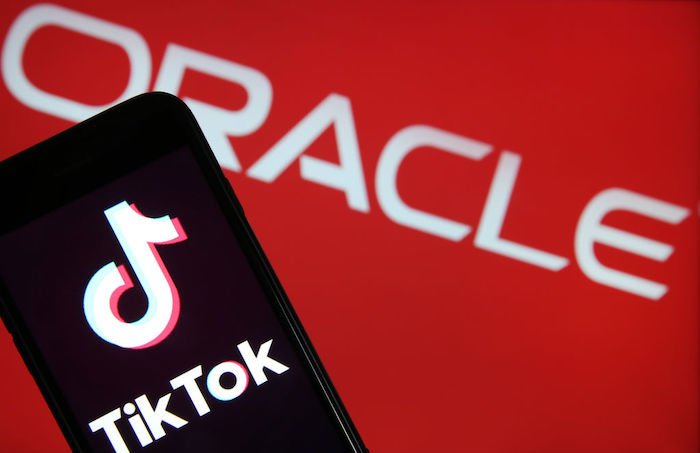Fact-checking the “fact-checkers”

What’s new: Heritage is calling out PolitiFact and Facebook for abusing the social network’s fact-checking program.
Why this matters: Partisan groups are abusing their fact-checking roles to suppress conservative political ads and other content.
Key points:
-
Facebook uses a network of outside “fact-checkers” to review and to rate ads to identify and remove false information and “fake news.” These fact-checkers include groups from across the political spectrum.
-
If an ad is rated as anything less than “truthful,” it will not be allowed to run on Facebook as an ad, but may be allowed as an “organic post.”
-
Earlier this week, PolitiFact rated a proposed ad campaign by The American Principles Project (APP) as “missing context,” which spiked the ad from being run on Facebook.
-
The APP ad targets Sen. Gary Peters’ support of The Equality Act and asserts that, if passed, the act would “destroy women’s sports.”
-
PolitiFact justified their rating of the ad as “missing context,” by saying, “That’s a prediction we can’t fact-check.” But in essence, that’s precisely what they did.
-
On Wednesday, The Heritage Foundation issued a joint press release with Heritage Action for America calling attention to this politicization of the fact-checking program and calling on Facebook to suspend PolitiFact’s participation and for a full review for any other abuses.
What we’re thinking: First, Heritage does not endorse or oppose candidates, or otherwise support the content of any ads mentioning candidates. For us, this isn’t about a particular politician, race, or legislative issue — it’s about fairness and accountability. Second, this is not a case where there is any ambiguity — PolitiFact is gaming the system for political points and Facebook is allowing this to happen. And finally, third, Facebook’s credibility with conservatives (already threadbare) is on the line. Many of us understand the need for nuance and understanding when it comes to claims of online mistreatment or bias; but, our job of informing and refining others is made that much harder when egregious abuses like this go unaddressed.
A call to duty

What’s new: I (Klon) just published an op-ed outlining how the US can expand its defense industrial base to meet emerging challenges.
Why this matters: Decades of regulations, cumbersome bureaucratic requirements, and unnecessarily burdensome auditing requirements — all of which flow from a sincere and well-intentioned desire to protect against fraud and maximize value for taxpayers — have given us a defense industrial base struggling to meet the nation’s needs.
Key points:
-
Earlier this year, the National Defense Industrial Association gave the defense industrial base a “C” grade and warned that things are getting worse.
-
Unfortunately, America no longer enjoys sufficient technological advantage over our peer competitors to allow for slow, incremental changes.
-
To be reliably secure, we must continually improve — and do so faster than our adversaries. This requires three adjustments to the Pentagon’s innovation and acquisition programming.
-
First, the Defense Department must incentivize nontraditional partners to join the defense industrial base and to invest their own resources into military-relevant research and design (R&D).
-
Second, the Pentagon and Congress should be basing price negotiations on a technology’s value to national security, not artificially low or noncompetitive profit margins.
-
Finally, third, we have to simplify and shorten the acquisition process. This is non-negotiable.
-
Bottom line: The United States will not be able to secure its people or protect its interests without greatly expanding its defense innovation base — and that will require making it more profitable, more agile, and less bureaucratic.
Something is happening with TikTok & Oracle (maybe)

What’s new: TikTok’s parent company ByteDance has rejected a purchase offer from Microsoft and is reportedly working to close a deal led by Oracle and Walmart.
Why this matters: There’s a lot of reporting around the deal; however, critical details about how this proposal addresses the US’s underlying national security concerns are still unknown.
Key points:
-
Earlier this week, ByteDance officially rejected a deal from Microsoft that would have transferred all of TikTok’s US business, operations, data, and assets to Bill Gates’ baby.
-
Soon thereafter, it was reported that TikTok and Oracle had made a deal and that the Trump administration would make a ruling on the deal this week.
-
As of the writing of this newsletter, the US has not announced its judgement on the Oracle-TikTok proposal.
Reported details of the deal:
-
It is confirmed that under the proposal, Oracle would become a “trusted technology provider” for ByteDance — though it is unclear what that actually means. At least part of that means, Oracle would reportedly take over “management” and “processing” of TikTok’s US user data — though reporting on this is unclear.
-
Treasury Secretary Steven Mnuchin also says ByteDance will establish TikTok as a US-headquartered company and create 20K new jobs. But, instead of an outright purchase, the Oracle-TikTok relationship would be more of a “partnership” without the “exchange of significant assets,” The Wall Street Journal first reported.
-
The new corporation would have ByteDance as the majority shareholder and Oracle as a minority shareholder, according to the Wall Street Journal.
-
Also, the new TikTok entity plans to have “independent oversight” and be managed “at arm’s length” by ByteDance, the Financial Times reported.
What we’re thinking: There are a lot of unknowns, but our general posture is skeptical. First, a lot of this reporting feels like Oracle and ByteDance making promises and agreements they aren’t empowered to make — the real decisionmakers are the governments in Washington and Bejing. Second, China understands its national security and datasecurity laws to apply extraterritorially to all Chinese companies. It’s reasonable to conclude that, even if TikTok is headquartered in the US, ByteDance’s controlling stake in the company (and more importantly their real technical linkages) would still make the social network bound to these laws. This is why Microsoft’s offer was to buy the company and completely seal it off from Chinese ownership. Which brings us to our third point: the policy goal is to protect US users and data; not to successfully sell TikTok to a US company. The US acquisition of TikTok is one potential way of meeting our policy objectives — but it is not the only way.
If the Oracle-TikTok deal does not FULLY address US national security concerns it should be rejected.
Deep Dive: the rise of China’s system of oppression

What’s new: Georgetown’s Center for Security and Emerging Technology (CSET) has a new report on “China’s System of Oppression in Xinjiang: How It Developed and How to Curb It.”
Why this matters: The Chinese government is currently holding more than one million Uyghurs in “reeducation camps” and has rolled out an unprecedented surveillance state in Xinjiang.
Key points (adapted from the report):
-
Since 2016, China has intensified a regime of technologically driven mass surveillance, internment, indoctrination, family separation, birth suppression, and forced labor against its Uyghur population.
-
More than 1,400 Chinese companies are providing facial, voice, and gait recognition capabilities as well as additional tracking tools to the Xinjiang public security and surveillance industry in support of this regime.
-
While a handful of these companies have been placed on the Department of Commerce’s Bureau of Industry and Security’s (BIS) Entity List, this sanctioning has not yet significantly arrested these companies’ development.
-
Furthermore, Western companies continue to sell Chinese firms core hardware such as chips and storage solutions, for which China currently lacks viable homegrown alternatives.
Here’s what the report says should be done:
-
The United States must more clearly articulate the intended aims of its policy actions on Xinjiang, including but not limited to the closure of its internment camps, the reduction of surveillance, and the elimination of “pre-criminal” profiling of Xinjiang’s indigenous peoples.
-
The Uyghur Human Rights Policy Act of 2020 and the Tariff Act of 1930 should be resolutely applied to address forced labor and other repression.
-
BIS and the State Department, along with academics, researchers, and NGOs, should publicly report on Chinese surveillance companies’ supply chains to close alternative solutions loopholes and increase corporate due diligence.
-
Candidates for the Entity List should also be informed by a public repository of rights abuses in Xinjiang and beyond.
-
The State Department-run Track 1 dialogues and the newly formed Inter-Parliamentary Alliance on China (IPAC) and Global Partnership on AI (GPAI) should also develop an allied set of principles and goals for countering the global expansion of China’s surveillance approach, as well as proposing alternative surveillance technology standards at the United Nations’ International Telecommunications Union.
-
And finally, US allies should strengthen refugee and cultural protection for Uyghurs, and apply sanctions to responsible entities and individuals.
What we’re thinking: This is another great CSET report. Heritage has also done a number of reports on China’s oppression and this one by Olivia Enos is especially good. In reality, Beijing is unlikely to change course in the near-term when it comes to opressing Uyghurs and other religious and political minorities. Raising global awareness of this oppression and pressuring those that are enabling this oppression, however, is critical for building the political will to eventually bring about such change. Until then, pray for the Uyghurs and others suffering under the CCP’s techno-totalitarianism.
Microsoft’s seabed server success

What’s new:Microsoft says they’ve proven that underwater servers are “reliable, practical and use energy sustainably.”
Why this matters: Underwater datacenters could make sophisticated networking more reliable and sustainable and could even offer a new solution for those who need to deploy tactical and critical datacenters around the world.
Key points:
-
In 2017, engineers theorized a sealed container underwater could improve the overall reliability of datacenters by avoiding humidity, oxygen corrosion, temperature fluctuations, and other variables that contribute to equipment failure.
-
So they sunk a sealed datacenter 117 feet deep on the seafloor off Scotland’s Orkney Islands.
-
The datacenter operated underwater for two years and was retrieved earlier this summer.
-
“We are populating the globe with edge devices, large and small,” said William Chappell, vice president of mission systems for Azure. “To learn how to make datacenters reliable enough not to need human touch is a dream of ours.”
What we’re thinking: More than half of humans on earth live within 150 miles of the coast. Parking datacenters underwater near these populations could dramaticaly improve internet services by shortening the distance data needs to travel. There’s also some pretty cool applications we can think of to support military and intelligence deployments to austere operating environments.







Please note that we at The Dispatch hold ourselves, our work, and our commenters to a higher standard than other places on the internet. We welcome comments that foster genuine debate or discussion—including comments critical of us or our work—but responses that include ad hominem attacks on fellow Dispatch members or are intended to stoke fear and anger may be moderated.
With your membership, you only have the ability to comment on The Morning Dispatch articles. Consider upgrading to join the conversation everywhere.